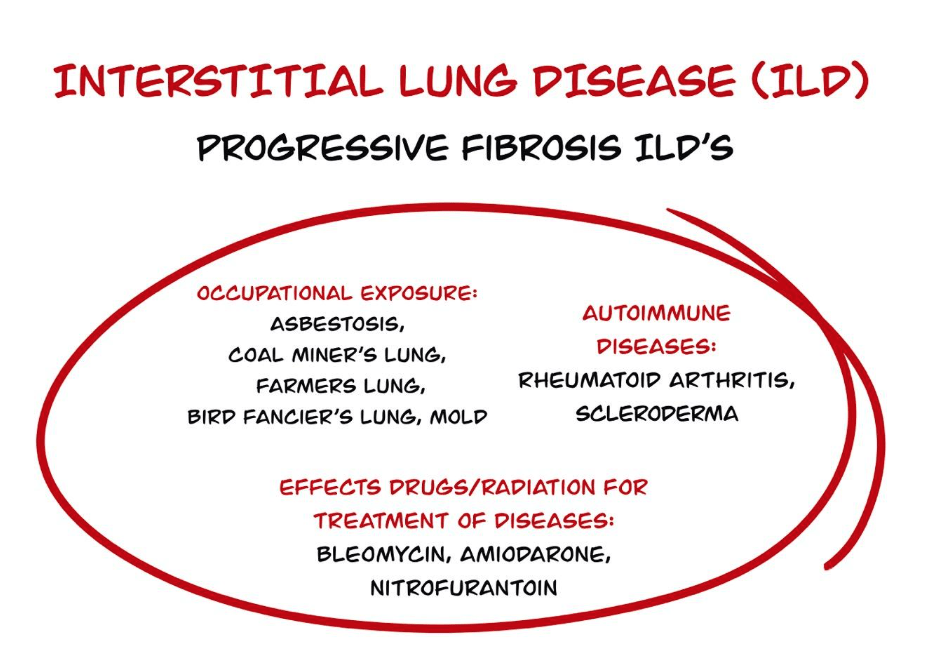Medications
Although there is no cure for pulmonary fibrosis, there are medications available to slow disease progression.
Different medications are used for different types of pulmonary fibrosis. Some common drug therapies are described below.
Medications for pulmonary fibrosis (PF) have advanced a great deal in the past decade and research continues today to improve our knowledge of the disease and to develop new and improved drugs. The ultimate goal, of course, is finding a cure.


There are about 200 types of pulmonary fibrosis, with idiopathic pulmonary fibrosis (IPF) being the most common. Due to differences in the causes of PF, a medication prescribed to treat one form of the disease may not be the right one for another form of the disease. You and your doctor will decide which medications are best for you.
Types of Medications
Antifibriotic Medications
There are two antifibrotic medications approved in Canada for the treatment of IPF – nintedanib (OFEV) and pirfenidone (Esbriet). Pirfenidone is also available as a generic medication. These medications do not cure IPF, but clinical trials have shown that they may slow how quickly scar tissue forms in your lungs by up to 50 per cent.
In 2020, nintedanib was also approved to treat progressive fibrosing interstitial lung disease (PF-ILD) which is a group of lung diseases that also cause scarring in the lungs. Both drugs are listed and covered by provincial and territorial governments across Canada, as well as by First Nations and Inuit Non-Insured Health Benefits (NIHB). As of June 2022, the exception is that nintedanib is not yet listed or covered by the Yukon or Nunavut for the treatment of PF-ILD. Check other medication resources at the bottom of this page for provincial policies for drug coverage.
Immunosuppressants
Immunosuppressants are not recommended for the treatment of IPF, except when there is an acute exacerbation (a breathing crisis, usually requiring a hospital visit). They are commonly used for other forms of PF.
Immunosuppressants suppress your immune system when it is too active. Prednisone is the most common immunosuppressant used for PF. Others include mycophenolate mofetil (myfortic), mycophenolic acid (cellcept), imuran, methotrexate, cyclophosphamide, cyclosporin, rapamycin, and tacrolimus.
Other Medications
Idiopathic Pulmonary Fibrosis is strongly associated with gastroesophageal reflux disease (GERD), a condition where stomach acid flows back into the esophagus. Your doctor may prescribe medications to treat GERD if needed.
Your doctor may also recommend various over-the-counter medications which can help you deal with various PF drug side effects, such as diarrhea or nausea.
Drug Coverage by Province
BRITISH COLUMBIA
ALBERTA
MANITOBA
Pirfenidone & Nintedanib (See page 81)
SASKATCHEWAN
Pirfenidone & Nintadanib (See pages 61 & 67)
ONTARIO
Pirfenidone & Nintedanib (See pages 353 & 355)
NEWFOUNDLAND
Pirfenidone & Nintedanib (See pages 209 & 237)
NOVA SCOTIA
Pirfenidone & Nintedanib (See pages 85 & 99)
PRINCE EDWARD ISLAND
Pirfenidone & Nintedanib (See pages 424 & 439)
YUKON
Pirfenidone & Nintedanib (See pages 269 & 285)
NORTHWEST TERRITORIES
Extended Health Benefits for Specified Disease Conditions Program (Alberta Blue Cross)
NON-INSURED HEALTH BENEFITS (NIHB)
Last reviewed on February 13, 2024.
International PF Patients
The CPFF receives inquiries from PF patients around the world who want to get access to medications that are not in their country. They want to know if it can be prescribed for them in Canada. The University Health Network, through Toronto General Hospital, has an International Patient Service to process such requests.
More on Medications
The History, Present and Future of Pulmonary Fibrosis
Dr. Martin Kolb is optimistic that within 10 years, researchers will find a way to halt the progression of pulmonary fibrosis. Learn more about the history, present state, and future of pulmonary fibrosis.
Drug Therapy for Pulmonary Fibrosis
Dr. Martin Kolb discusses drug therapy for patients with pulmonary fibrosis.
Generic Antifibrotics: Is a Rose a Rose by Any Other Name?
Read More…
Managing the Side Effects of Medication through Nutrition
Sarah Dales, Registered Dietitian and Deepanshi Salwan a nutrition student offer concrete suggestions to help…
UHN Pirfenidone Fact Sheet
This fact sheet created by University Health Network (UHN) Pharmacy department explains what this medicine…
UHN Nintedanib (Ofev®) Fact Sheet
This fact sheet created by University Health Network (UHN) Pharmacy department explains what this medicine…





